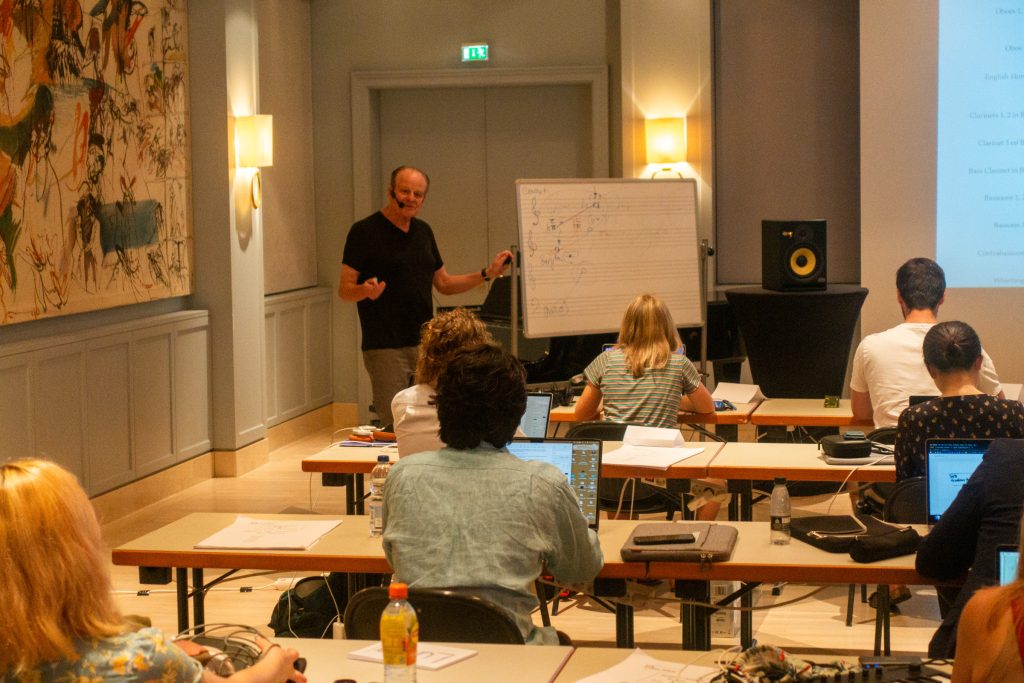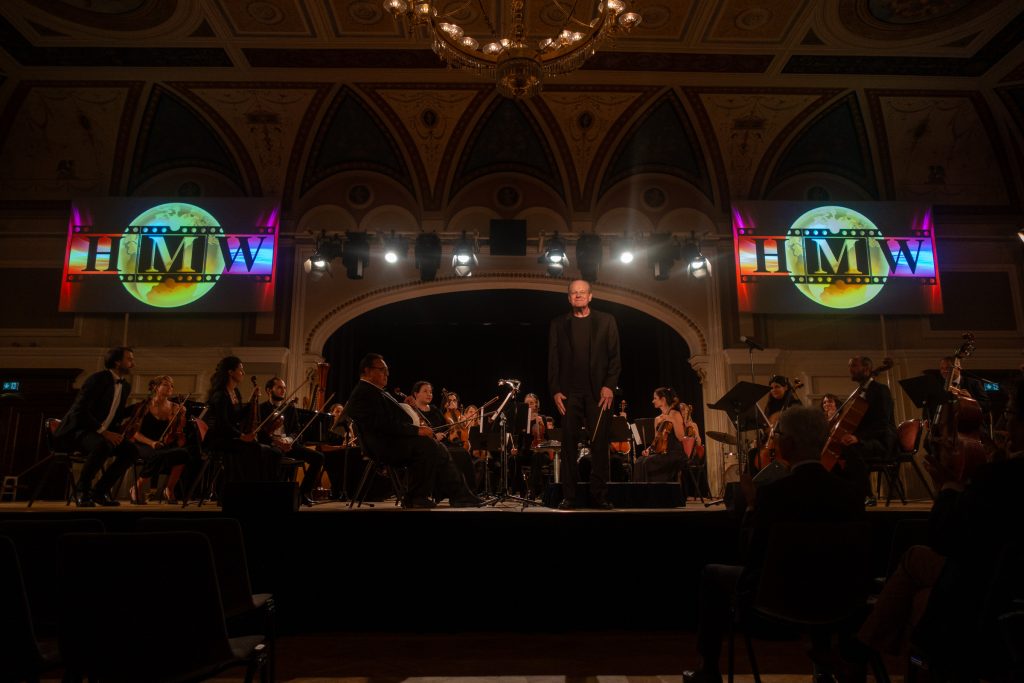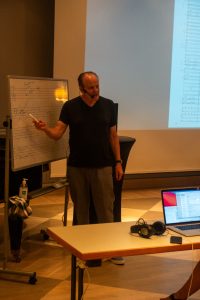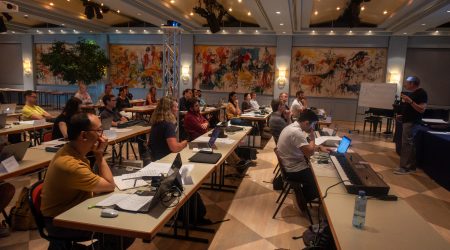During my stay at the Hollywood Music Workshop in Baden in July 2023, I had the honor to sit down with one of the course instructors, Conrad Pope. Pope is a well-established figure in the film music industry for many decades. As an orchestrator who translates music from a composer to sheet music that orchestras can then perform, he has worked from the shadows with almost every big name in Hollywood, including James Horner, Alan Silvestri, John Williams and many more. Many of these names were mentioned during the interview, and he talked highly of them, but if you read between the lines, you can also read how experienced and knowledgeable he is. If you are interested in film music, this interview is, in my opinion, a must-read. I want to thank the Hollywood Music Workshop for the invitation and this marvelous opportunity to have a glimpse into Pope’s fantastic brain.

Anton Smit: Thank you Conrad for this interview here in Baden. So you are here for the 10th year?
Conrad Pope: This is my 12th year actually with the Hollywood Music Workshop. The first two years we were in Klosterneuburg, which is right north outside of Vienna, and then we moved here because it seemed to be a better venue, and Beethoven of course. This was his summer home, and he spent a lot of time here, and Mozart as well. Mozart wrote the Ave Verum Corpus up the road here from the casino, and then, of course, Baden is very famous for the casino, for people that like to lose their money! Luckily the casino gives us a good space and a good concert hall. It’s really quite wonderful.
In the first year I did, we had 64 students from 24 countries. When I was younger, that was a long time ago, people used to say music is a universal language, and I actually thought: Really? Are Western music, Indian music and all the different kinds of world music the same? No, I don’t think so, but I will say this: Film music has become the world music, and it’s amazing how it speaks to people in like China, because we’ve had people from China, Abu Dhabi, Finland, and even though, I tend to joke, we had people from Texas, because I generally don’t teach in the States. This is something I do only over here for some friends, because I’m generally too busy. But one of my teachers, when I was young, was an Austrian, and he said: A good musician plays a little, thinks a little and teaches a little. Music is definitely an apprenticeship business, and I think it is for those of us with some experience that it is our responsibility. If we want to keep things going, we should try to pass down what we have found valuable. Let the next generation pick from that what they find valuable and at least try to keep some sort of continuity going. That is why I come here every year.
AS: What you’re teaching here is orchestration, and not everyone knows what orchestration is. I had a conversation with a fellow amateur musician, and he was like: A composer writes music. He had the impression that the composer’s end product is all his work until the notes on paper. We both know that is not the case because your job as an orchestrator comes in to help him with his work. So what are the strengths of an orchestrator to help a composer reach the end goal?
CP: You are exactly right. When people ask me what an orchestrator is, I use a studio musician in Los Angeles as an example. He is a friend of mine. He said: Orchestration is any job you say yes to. Every composer is different than when you are an orchestrator, but you are at least in the Hollywood scene. To back up a little bit. I didn’t know what an orchestrator was until I went to Hollywood myself, because I always thought: Well, composers compose, and composers orchestrate, and that is certainly how I was trained when I was growing up. I even made it a point to sort of play every instrument from every choir. I played a woodwind instrument, I played a brass instrument, and I played a string instrument, but my main instrument was the goal of learning how to compose and know these things, because I always figured that I had to orchestrate my own music, like Brahms. But, when you get into commercial music, there are these things called deadlines, and everything becomes compressed.
If you are a concert composer, you can take a year to write a piece, do your own orchestration, and do everything. In the commercial world, an orchestrator is somebody who can run the gamut of being basically a glorified copyist in many ways, as I would say with John Williams. John does not write a sketch, but what he gives you is a short score. It is on just a few lines of music, like maybe three or four staves. What he does is that he just indicates bass clarinet and various things. It gives you all the instrumentation but in shorthand. John does everything you need to know to make a final orchestration, but it is in shorthand and so the orchestrator just has to know how to read John’s shorthand, communicate and know what he wants. Orchestrating runs from that to somebody like I had as one of my first jobs: A composer needed a piece written, and so he gave me four bars, and then I had to complete a three-minute piece from those four bars. It runs that whole gamut from just transferring from this little piece of paper to a big piece of paper, just filling in all the parts that are indicated, to someone that goes: Look, I don’t have time to finish this. Here is my idea. Can you finish this out? And everything between those cases, because every composer I have orchestrated for has been different. Working for James Horner is different from working for Alan Silvestri, Hans Zimmer, and Alexandre Desplat. Everybody has a need, and you have to be able to sort of fill that need. You have to have a number of skills, and they are not hard to acquire.

When I first came to Hollywood over 35 years ago, an orchestrator needed to know various styles of music, to write like from Mozart to what you would do in a dance band in 1930 or 1940 and all these various things. In a way you have to be eclectic in your approach. Maybe one of my problems is that I am very good at being eclectic, but that also makes me a valuable resource for a number of composers when they have various needs. A composer like Alexandre Desplat is a wonderful orchestrator himself in the sense that he has a wonderful sense of the color for the orchestra. He has a very keen ear for what he wants to hear. He does these demos with electronic instruments that always give me a sense of exactly what he wants to do, and that is what I tend to do. I get his demos, and then we print out the electronic music file, and then I fill in the instruments, and try to be very true to his colors, because he always has a very distinctive outlet for each movie that he does.
I worked for James Horner at times. He was very special. I loved working for him. I did very little on the first film I worked on, but it was a great honor. It was The Rocketeer, which is one of the best things I remember with James. For that he would sometimes just write maybe a single line with a melody, but he would need it to be just fleshed out more. It was never a big cue but a small thing. With one composer I have worked with for a long time, I would sometimes get, again, maybe just a one-line melody and then a videotape of the movie with the temp track that needed to sound similar. In one case the composer gave me basically one line to do that had been temp-tracked with The Rocketeer. This was fabulous. I worked on the film very familiar with the techniques of that film, so I was able to help the composer get across the finish line.
Today, things have changed. Particularly if I can reference Desplat is that with the technology we have now, orchestration is not what it was when I first began, because there were no demos in the sense that we have today. That was actually an invention of Hans Zimmer. In fact, I don’t know if you’ve seen this BBC documentary on Hans yet. It is called Hans Zimmer: Hollywood Rebel.
AS: I think not, but I think I will!
CP: You must see it because he basically said that he invented demos and I think he did. Hans has been a force of changing the business in so many ways, and not the least of which he has been one of the most generous composers by giving so many talented people their break, whether it is John Powell, Harry Gregson-Williams, or in earlier days Jeff Rona. But today we have the technology. What I tend to do is with pencil and paper. What guys do today is creating samples that are so complete. Tom Holkenborg, for instance. He has got a very keen ear and knows precisely what he writes, and what is amazing is that he voices the brass, and you can use those brass voices. You can almost just basically take his demo, or his mock-up, and just transfer it directly to paper.
AS: I have a question about that because now you have all these mock-ups and stuff, and you are familiar with only a couple of staves with parts of notes and instructions. Which method do you prefer the most?
CP: I liked working for John Williams. I haven’t orchestrated for John in a few years. The only thing I have done for John was some stuff for Anne-Sophie Mutter, an arrangement of “Princess Leia’s Theme,” and one for “Prayer for Peace,” which was less successful though, because I think I did a little bit too much and so it got caught cut back. I prefer the old way because those are my skills. Today, composers actually don’t necessarily want your input on how many horns to use or any of the colors because they always say that their demo has the information. I would say that they are generally right, because I think there has been a decline in orchestral color. So many of the scores sound pretty much the same, particularly when you get into the Marvel and the DC Universe. An exception being Benjamin Wallfisch. He is a horse of a different color, as they say.
From my perspective, people always have this thing about, you know in science fiction: The machines are going to become human. Well, I think the real book that has to be written is about how we become the machines because the machines teach us what they think sounds good and what is going to work well from the sample libraries. That is why so much of the music today has so many of the same sounds and the same way of dealing with things. The machines are teaching us what sounds good in the demo. The orchestra is not a machine, and it has other colors in there that you can’t really get with the Spitfire Library. No offense against Spitfire; it is a great library, but everything has its limitations, and it is good to know their limitations as well as their strengths.

AS: What would you advise then to a composer just starting to get into the business, and what would you advise them on how to make a ‘colorful’ score?
CP: You ask an interesting question. Back when I first got into the business, I was always struck by the composers at that time, and that includes people like Bruce Broughton, Jerry Goldsmith, who was still with us, and of course John Williams and Alex North even. In fact, one of the first things I did when I went to work at JoAnn Kane years ago was to take Alex North’s scores from like Spartacus, A Streetcar Named Desire and The Rose Tattoo and make them ready for one of the first concerts at Fimucité in Spain. I think it was for them that I did these cut-downs, because the Spartacus score is just fascinating. Henry Brant, who was one of the great orchestrators back in the day working for Alex North, used all these sorts of oddities like a buccina, which is like a Roman trumpet. They used these far-out instruments all over the place, so we had to make it for a standard-size orchestra.
To a composer today, I would actually say: Don’t listen to film music; well, listen to it; you got to know the business, but be sure that you have listened to Ravel, Stravinsky and these other composers who were instrumental in creating the orchestral sound of 20th century music. Not that you can write The Rite of Spring for a movie, though Jaws comes pretty close. You can tell that John Williams is sort of steeped in the tradition of Western music in every way. Jaws is kind of like Stravinsky, and Hook is a miraculous Bréville and all these wonderful sort of impressionistic pieces. That is what I would tell young composers, which means you might have to write a few more notes because music has become for the most part very simple. People use mainly major chords and minor chords, so it is a very simple harmonic language, not to get too technical, whereas John Williams, it sounds simple, but it is not. That is the amazing gift he has, because the melodies are so simple but they are harmonized in such inventive ways that it belies their sophistication.
AS: Music notes have been here for hundreds of years. You have been working with them for many decades. It is a well-established language. If you had the power, would you have changed something to the musical language?
CP: If I had the imagination, I would! But sadly I am just one of the proletariats here, and I don’t think I could change the musical language. I do think that is one of the great gifts of being an orchestrator and having worked for so many composers because, like I have said, I have worked for almost every composer in Hollywood at least once, and I value when I have been called back twice. I think the composers themselves and also film have managed to sort of change the vocabulary basically through sound and color. Now that we have such a wealth of instruments and various colors that are now being incorporated into Western orchestras, the hybrid scores and all this stuff, that is how the music vocabulary is changing. That is up to those composers, and I am here to just smile and try to help them do what they need to do to change and progress the language.
AS: Thank you very much for this interview!
CP: My pleasure.


